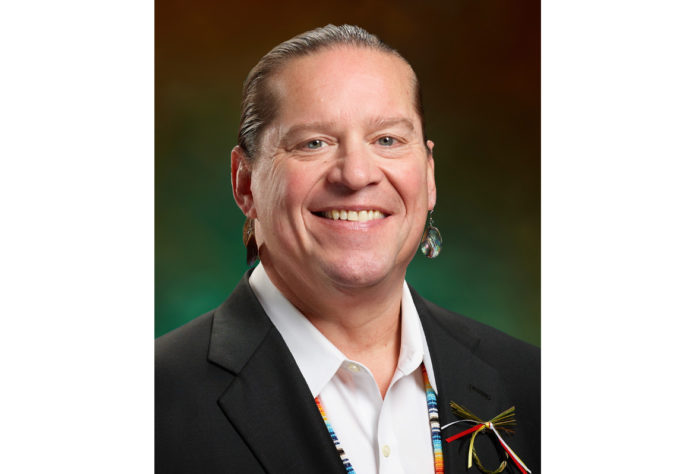GRAND RAPIDS, MI – Jamie Stuck, Chairperson of the Nottawaseppi Huron Band of the Potawatomi (NHBP) Tribe, joined a list of historical leaders as he was welcomed as a visiting dignitary by Harvard University and invited to sign the university’s guest book. The book contains hand-written signatures and messages from numerous distinguished leaders of many different nationalities, backgrounds, and beliefs including South African President Nelson Mandela, German President Angela Merkel, and Congressman John Lewis.
“To walk in the footsteps of world leaders and add the name of the Nottawaseppi Huron Band of the Potawatomi to this book was a tremendous honor for me as I represented our tribal ancestors, current elders, and our brothers, sisters, children, and grandchildren,” said Chairperson Stuck. “We are the sixth Indigenous tribe to sign this book in the past year, reflecting a tidal shift in recognizing Native American sovereignty and equality at Harvard University and throughout the United States.”
Harvard University regularly invites distinguished leaders to visit the campus and speak to classes, advancing educational enrichment for its students and furthering the impact of its curriculum.
“This invitation represents yet another important recognition for Indigenous people in this country,” said NHBP Tribal Council Vice Chairperson, Dorie Rios. “We are grateful for the opportunity to be included in this historical ledger and share our proud and prosperous story with faculty, students, and visitors at this long-standing academic institution.”
In addition to Chairperson Stuck’s and Vice-Chairperson Rios’ visit, the leader of the NHBP economic development company spoke to faculty and students at the Harvard Kennedy School. Deidra Mitchell, Waséyabek Development Company President and CEO, provided insights to the Nation Building II: Native Americans in the Twenty-First Century class, led by Eric Henson, Director of the Ittapila Program for Nation Building and Outreach at Harvard. It’s the second consecutive year that Mitchell has addressed students at the university.
“It was a terrific experience,” said Mitchell. “The students and faculty were welcoming and engaged, which made for a compelling discussion about the realities facing Indigenous populations as they work to preserve their sovereignty and way of life. Harvard is fortunate to have someone with Professor Henson’s insights leading this important topic.”
Professor Henson is a citizen of the Chickasaw Nation, and since 1998, has been working with the Harvard Project on Indigenous Governance and Development (formerly known as the Harvard Project on American Indian Economic Development).
“The Waséyabek team has set the standard when it comes to incorporating the principals of the Harvard Project,” said Henson. “The practices they employ in their strategic planning, work culture, and business development have taken root and resulted in tremendous growth and organizational success.”
Waséyabek is among the largest Native American non-gaming economic development companies in Michigan. Its portfolio now includes more than 30 business entities, including manufacturing, defense industry software integration, environmental solutions, real estate management, and transportation. Altogether, the portfolio companies employ more than 500 people, and are located throughout the U.S.

















































